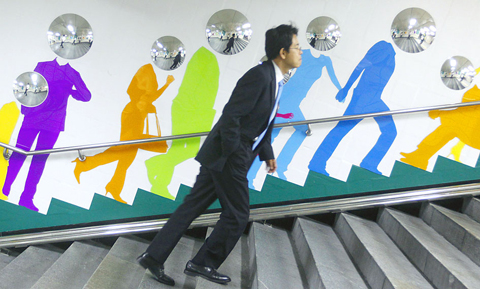The South Korean economy expanded in the second quarter at a faster pace than initially estimated, driven by consumer spending and business and construction investment.
GDP grew 2.6 percent from the previous three months, compared with the July 24 estimate of 2.3 percent, the Bank of Korea said in Seoul yesterday. The economy shrank 2.2 percent from a year earlier, compared with the previously published 2.5 percent decline.
“The revision shows private demand is actually picking up and growth is not just driven by government support,” said Kwon Young-sun, a Hong Kong-based economist at Nomura Holdings Inc. “I believe the current upswing will continue as there’s room for more factory output amid lean inventory.”

PHOTO: REUTERS
The benchmark KOSPI stock index has gained 43 percent this year and the currency 1 percent against the dollar, the third-best performer among Asia’s 10 most-traded currencies excluding the yen. Exporters including Samsung Electronics Co, Hyundai Motor Co and LG Electronics Inc boosted profits last quarter as South Korea, China and Singapore led a regional rebound.
South Korea’s economic expansion in the three months to June 30 is its fastest since the fourth quarter of 2003.
Private consumption advanced 3.6 percent from the first quarter, compared with a 3.3 percent expansion in the initial GDP report, due to increased spending on goods such as cars.
Corporate investment at factories and for equipment climbed 10.1 percent from the first quarter, compared with the previously published 8.4 percent gain.
The economy has achieved one of the highest growth rates among OECD countries as support from the government and the central bank bore fruit, Jung Yung-taek, head of the Bank of Korea’s national income statistics team, said in Seoul yesterday.
The bank has no immediate plan to revise its yearly gross domestic product estimate, he said. The Bank of Korea forecast in July the economy would contract 1.6 percent this year.
Last month, the bank kept its benchmark interest rate unchanged at a record low 2 percent for a sixth consecutive month.
The government has pledged more than 67 trillion won (US$54 billion) in stimulus, injected money into the financial system and set up a fund to replenish bank capital.
The IMF last month said South Korea’s economy will contract a less-than-estimated 1.8 percent this year. Citigroup Inc said last month that the South Korean economy could contract 1.5 percent this year, less than its previous estimate, as exports would be “more resilient” than expected.
Exports gained 14.7 percent in the second quarter from the previous three months, the same as the expansion reported in July. Construction investment grew 1.7 percent from three months earlier, compared with the 0.4 percent gain initially announced.
Government spending increased 1.1 percent from the first quarter, compared with the 1 percent gain initially announced.

Authorities have detained three former Taiwan Semiconductor Manufacturing Co (TMSC, 台積電) employees on suspicion of compromising classified technology used in making 2-nanometer chips, the Taiwan High Prosecutors’ Office said yesterday. Prosecutors are holding a former TSMC engineer surnamed Chen (陳) and two recently sacked TSMC engineers, including one person surnamed Wu (吳) in detention with restricted communication, following an investigation launched on July 25, a statement said. The announcement came a day after Nikkei Asia reported on the technology theft in an exclusive story, saying TSMC had fired two workers for contravening data rules on advanced chipmaking technology. Two-nanometer wafers are the most

Tsunami waves were possible in three areas of Kamchatka in Russia’s Far East, the Russian Ministry for Emergency Services said yesterday after a magnitude 7.0 earthquake hit the nearby Kuril Islands. “The expected wave heights are low, but you must still move away from the shore,” the ministry said on the Telegram messaging app, after the latest seismic activity in the area. However, the Pacific Tsunami Warning System in Hawaii said there was no tsunami warning after the quake. The Russian tsunami alert was later canceled. Overnight, the Krasheninnikov volcano in Kamchatka erupted for the first time in 600 years, Russia’s RIA

CHINA’s BULLYING: The former British prime minister said that he believes ‘Taiwan can and will’ protect its freedom and democracy, as its people are lovers of liberty Former British prime minister Boris Johnson yesterday said Western nations should have the courage to stand with and deepen their economic partnerships with Taiwan in the face of China’s intensified pressure. He made the remarks at the ninth Ketagalan Forum: 2025 Indo-Pacific Security Dialogue hosted by the Ministry of Foreign Affairs and the Prospect Foundation in Taipei. Johnson, who is visiting Taiwan for the first time, said he had seen Taiwan’s coastline on a screen on his indoor bicycle, but wanted to learn more about the nation, including its artificial intelligence (AI) development, the key technology of the 21st century. Calling himself an

South Korea yesterday said that it was removing loudspeakers used to blare K-pop and news reports to North Korea, as the new administration in Seoul tries to ease tensions with its bellicose neighbor. The nations, still technically at war, had already halted propaganda broadcasts along the demilitarized zone, Seoul’s military said in June after the election of South Korean President Lee Jae-myung. It said in June that Pyongyang stopped transmitting bizarre, unsettling noises along the border that had become a major nuisance for South Korean residents, a day after South Korea’s loudspeakers fell silent. “Starting today, the military has begun removing the loudspeakers,”